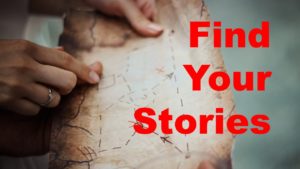How to Find Your Stories
 How and where can you find stories to support your messages?
How and where can you find stories to support your messages?
These stories are not the ones you tell to entertain your friends. These are stories to help you reinforce a point.
Tell your stories in conversations, meetings and presentations to be more effective in conveying your messages. You might wonder, “Where can I find my stories?”
The short answer is “All around you.”
Start to observe life as a reporter, biographer or archaeologist. Notice the happenings every day with fascination and wonder – to develop your story collecting and story-telling skills.
Harvest your stories from these three areas.
You and Your Experiences
This is the richest source for your stories because they are unique to you. Your experiences are the core of your stories. That includes both the mundane and the unusual. Some of your experiences will make better stories than others.
Search your memory for firsts and lasts because those tend to be memorable. How did your last time compare with your first time? There might be learning points in the contrast.
Your joys and successes can provide lessons and encouragement for others. Even small wins can be used to illustrate progress over time. What did you accomplish that you and others thought was impossible?
Your struggles can provide inspiration for others. Why do you think the Rocky movies were so successful? Because we love to hear about the underdog triumphing.
The biggest source for personal stories is your failures, embarrassments and pain. Why? Because you probably remember these moments vividly and these moments provide you the best lessons.
When you talk about your flaws, you appear more vulnerable and hence more relatable to the audience. Choose carefully which flaws you will expose. Do it to make a point that enhances your intended message.
Your Family
Your family is a wonderful source of warm and entertaining stories. When you think about family, include immediate, and extended along with your ancestors. What struggles, sacrifices and triumphs did they encounter? What lessons or legends have they passed down?
What customs and traditions are part of your family?
What funny moments can you recall?
Families are both congealed and torn by emotions. What lessons can you use from those events?
What did they say? Parents, grandparents and children say funny things. How might you use those statements, questions or conversations in your stories?
Family events offer fodder for stories – weddings, funerals, picnics, vacations, travel, meals, graduations, disputes, celebrations, gatherings…
The Community
This offers the largest catchment of stories. These tend to be less personal, yet the stories can still be effective to enhance your message.
Community includes interactions with your friends, neighbours, groups, clubs and associations. You are part of both formal and informal tribes.
You are a member of your neighbourhood, municipality, region and country. You are a member of your profession, industry and generation. What do you have in common?
You can find stories in your recreational activities. Do you play golf, watch baseball or attend the opera? What impressed you, annoyed you or intrigued you?
Your work offers stories that might be about your team, clients, colleagues, competitors…
TV, movies, music and books offer material for stories. I might use Star Trek anecdotes to make a point because that resonates with me. You could use an anecdote from a favourite TV show or movie.
News and history offer you stories. How might you use an anecdote from Einstein, the Wright Brothers or from the US space program?
If you want to tell more stories, start looking for them. You don’t need to look far or hard. Start becoming more receptive to everything around you. Ask yourself, “How might I use this situation to tell a productive story?”
How to Find Your Stories
Related posts for you


